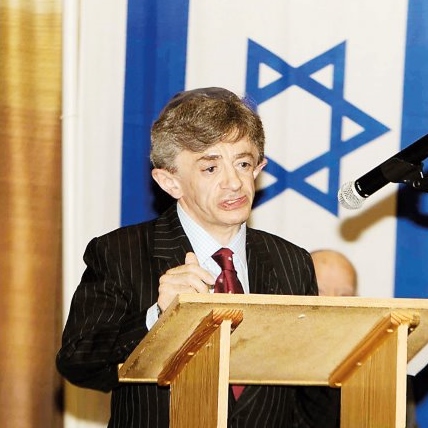click to dowload our latest edition
CLICK HERE TO SUBSCRIBE TO OUR NEWSLETTER


Published
5 years agoon
By
adminJORDAN MOSHE
Shinkwin spent much of his youth either in hospital or in plaster, so living with and fighting adversity is normal for him. His medical difficulties are, in fact, what led him to forge a unique connection with the Jewish people, and brought him to our shores.
“When you face challenges and fight for your survival, you develop traits which eventually allow you to succeed,” he says. Shinkwin was in South Africa at the invitation of Wendy Kahn, the national director of the South African Jewish Board of Deputies (SAJBD). “As difficult and traumatic as they may be, your circumstances enable you to develop the skills you will use to achieve.”
Today a British Conservative politician, Shinkwin has for years suffered from osteogenesis imperfecta, or brittle bone disease. Although he and his parents managed the condition effectively throughout his youth, he experienced major complications at the age of 24 which placed his very survival at risk.
“In 24 hours, I couldn’t breathe or swallow, let alone talk,” says Shinkwin. “I required life-saving neurosurgery, and it still took me three years to learn to talk again. After that I was traumatised, and diagnosed with PTSD [post-traumatic stress disorder].
“People look at a disabled person and think that they must be used to their disability. I will never get used to it. At 24, I realised that I was really disabled. Medical professionals around me told me that I should get used to not talking because their expectations were lower for me as a disabled person.”
It was his condition which brought him into contact with a man who would have a profound impact on him for the rest of his life, namely Hanuš Weisl, a Holocaust survivor. A respected orthopaedic and trauma surgeon, Weisl escaped Nazi-occupied Prague as part of the Kindertransport bound for Britain, meeting Shinkwin 32 years later.
Shinkwin would learn about his doctor’s past and Jewish affiliation only when the doctor retired in 1992. The significance of their connection became apparent immediately. “Our lives are made up of multiple dots,” he says. “The connections between them become clear only much later. Here was a Jew who had treated a disabled boy. Both of us would have been deemed untermensch [inferior] by the Nazis ,and put to death immediately upon disembarking at any death camp.”
“Despite his loss and suffering, Hanus devoted his life to alleviating the suffering of others and optimising their chances. This is a rare combination in doctors, who are usually trained to correct anomalies, but nothing more. He was ahead of his time in recognising that, like a survivor, a patient can make a treatment work or not.”
The two maintained their connection, such that when Shinkwin was appointed a lord in 2015, he devoted himself to championing both causes. The disabled and Jewish people, he felt, were united in their struggle against tremendous difficulties.
From the moment he received a call from then British Prime Minister David Cameron until today, Shinkwin remains astounded that he was invited to join the House of Lords.
“Every day am I surrounded by people who are at the top of their fields: generals, lawyers, professional athletes, politicians. Then there’s me. This is a privilege, but also a considerable onus, as it puts a huge responsibility on me to do significant things. Still, it proves that truly incredible things can happen to anyone in life.”
Inspired by his connection with Weisl, Shinkwin went on the March of the Living in Poland in 2018, driven by the duty to ensure that mankind never sinks to such levels again. “The descent into depravity happens so fast,” he says. “Even today, society can sink into extremism so rapidly. We always have to be on our guard, even in 2019.
“We have a duty to remember, but we also have a duty to hope and to push back. The Jewish community has taught me this. We all have the capacity for good, but we also have the capacity for harm. It’s up to us to push for what’s right.”
Shinkwin applies this perspective in his campaigns. “Where disabled people are not impaired intellectually, please do not have lower expectations,” he implores us. “They have a right to excel, realise their potential, and reach the top of any profession. We need to emulate the successes of all minorities by championing their rights too.”
In the case of anti-Semitism, we must stand together – Jews and non-Jews – on the basis of shared values and common humanity to build a better world. “The Jewish community around the world is strong in social justice and charity,” he says. “As varied as the spectrum of its religiosity may be, Jews everywhere have common values. If we adopt the same approach between Jews and non-Jews, we can achieve great things.”
Shinkwin is also committed to the state of Israel, saying that while it exists, Jews everywhere can live with a sense of security. “Had Israel existed earlier, the Shoah could not have happened. The subtext of BDS [the Boycott Divest Sanctions movement] is the same as that of the Arab League in 1945 – to ensure that Israel does not exist.”
He says rocket attacks and suicide bombings against Israel are unacceptable, and though there are issues that need to be addressed in the region, such tactics are unjust and cannot be endorsed.
“I dearly want to see a lasting solution put in place, and I am encouraged by Israel’s new regional alliances. It’s not all about the West Bank or Gaza, but about how the region as a whole can mitigate the effects of the ongoing conflict,” he says.
